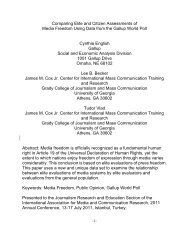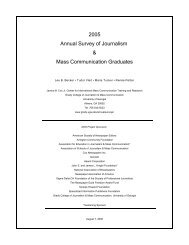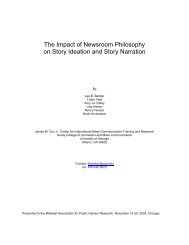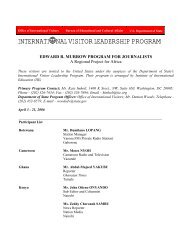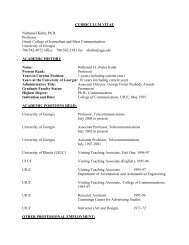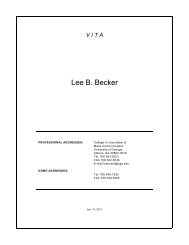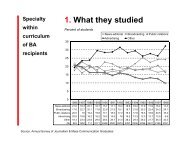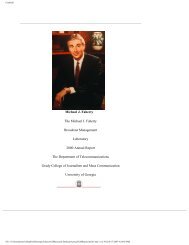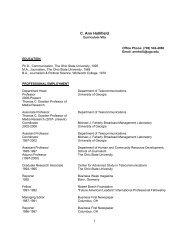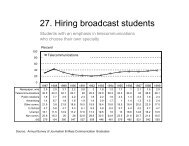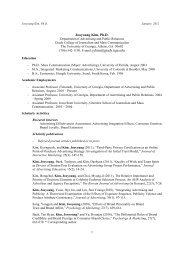Professionalism of News Workers - Grady College of Journalism and ...
Professionalism of News Workers - Grady College of Journalism and ...
Professionalism of News Workers - Grady College of Journalism and ...
You also want an ePaper? Increase the reach of your titles
YUMPU automatically turns print PDFs into web optimized ePapers that Google loves.
<strong>Pr<strong>of</strong>essionalism</strong> <strong>of</strong> <strong>News</strong> <strong>Workers</strong>: The Creation <strong>and</strong> Evolution <strong>of</strong> the Concept Page 8<br />
time the manuscript was prepared. They cite the dissertation work <strong>of</strong> K .E. Eapen (1969) on Indian<br />
journalists <strong>and</strong> Oguz Nayman (1971) on Turkish journalists as well as additional work on Latin American<br />
journalists by Lloyd Bostian, John McNelly <strong>and</strong> Ramona Rush. According to McLeod <strong>and</strong> Rush (1969a),<br />
McLeod, with colleagues James Fosdick <strong>and</strong> students Beatrice Linehan <strong>and</strong> James Scotton, also were<br />
conducting a study <strong>of</strong> Wisconsin newsmen at the time. None <strong>of</strong> this work was ever published.<br />
Some <strong>of</strong> the findings <strong>of</strong> this research, however, were cited by McLeod (1971), in a convention<br />
paper he presented to the Research Committee <strong>of</strong> the Association for Education in <strong>Journalism</strong> <strong>and</strong> Mass<br />
Communication. In this piece, McLeod distinguishes between pr<strong>of</strong>essionalization, or the process <strong>of</strong><br />
change by which an occupation moves from a craft to a pr<strong>of</strong>ession, <strong>and</strong> degree <strong>of</strong> pr<strong>of</strong>essionalism, or<br />
the way the journalist views his or her job. In using this terminology, McLeod moved away from the<br />
terminology <strong>of</strong> his earlier work (pr<strong>of</strong>essional orientation) <strong>and</strong> closer to that dominant in other literatures.<br />
Bobbitt, Breinholt, Doktor <strong>and</strong> McNaul (1978), in the organizational literature, for example, define degree<br />
<strong>of</strong> pr<strong>of</strong>essionalism as the extent to which an individual has internalized the value system <strong>of</strong> a pr<strong>of</strong>ession.<br />
Degree <strong>of</strong> pr<strong>of</strong>essionalization, in this terminology, is the extent to which an occupation has the<br />
10<br />
characteristics <strong>of</strong> a pr<strong>of</strong>ession. The key question for McLeod (1971) was: Are the more pr<strong>of</strong>essional<br />
news workers <strong>and</strong> more pr<strong>of</strong>essional media organizations, i.e., those hiring more pr<strong>of</strong>essional news<br />
workers, different from the less pr<strong>of</strong>essional news workers <strong>and</strong> less pr<strong>of</strong>essional news organizations?<br />
McLeod (1971) was looking for three types <strong>of</strong> consequences: in the attitudes <strong>and</strong> judgments <strong>of</strong> the news<br />
workers, in the performance <strong>of</strong> their news organizations, <strong>and</strong> in the desire <strong>of</strong> the news workers to stay in<br />
the occupation rather than leave it.<br />
The 1971 convention paper was meant as a summary <strong>of</strong> work to date, <strong>and</strong> McLeod drew on the<br />
Milwaukee study (McLeod <strong>and</strong> Hawley, 1964), the study <strong>of</strong> Latin American journalists (McLeod <strong>and</strong><br />
Rush, 1969 a & b), the dissertations <strong>of</strong> Eapen (1969) <strong>and</strong> Nayman (1971) <strong>and</strong> on a “1969 study <strong>of</strong> 219<br />
Wisconsin newsmen from almost all newspapers in that state” except the two Milwaukee papers,<br />
10<br />
See Becker, Fruit <strong>and</strong> Caudill (1987) for an elaboration on this distinction, p. 20.



